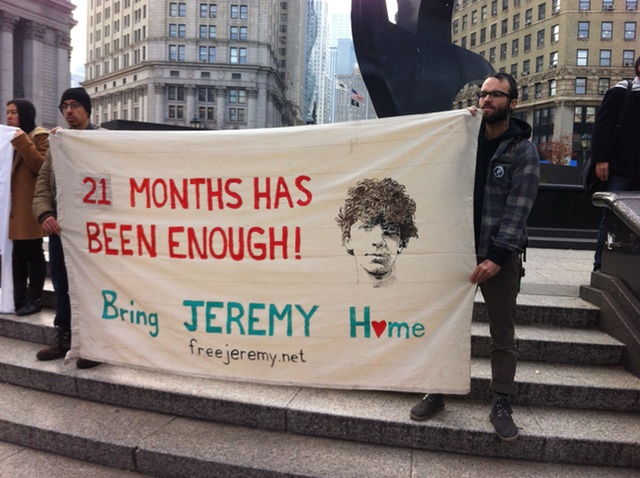'Hurrah For Anarchy!': Lulzsec Hacktivist Jeremy Hammond Sentenced To 10 Years In Prison
By Chicagoist in News on Nov 15, 2013 10:20PM

(Nick Pinto / Chicagoist)
Jeremy Hammond, the activist who pleaded guilty last spring to helping to hack into the computer system of the private intelligence company Stratfor, was sentenced to 10 years in prison today in a federal courtroom in New York City.
The sentence is the maximum Hammond could have received under his plea arrangement. Before agreeing to plead guilty, Hammond was facing more than 30 years in prison.
The hacking of Stratfor, which Hammond executed along with others associated with the Anonymous Lulzsec crew, led to the release of the company’s clients' credit card information, some of which was used by the hackers to make charitable donations. But it also revealed Stratfor’s email communications, which the hackers gave to Wikileaks for publishing.
Published as the Global Intelligence Files, the emails shed light on the previously murky world of private intelligence companies, their corporate clients, and their close ties to government intelligence agencies. The emails showed Stratfor surveilling activists on behalf of corporate clients like Bechtel and Dow Chemical, and confirmed that the Department of Homeland Security was monitoring Occupy Wall Street.
At today’s sentencing hearing, Hammond’s lawyer, Sarah Kunstler, urged Judge Loretta Preska to sentence Hammond to the nearly two years he has already served before and during his trial, arguing that while Hammond knowingly broke the law, he did it as a political act of civil disobedience in pursuit of what he believed to be a greater good.
Susan Kellman, another attorney working with Hammond, noted the irony that federal prosecutors ask for dismissals or lenient sentences for violent killers who cooperate with their investigations, but they were seeking a ten-year sentence for Hammond, whose crimes were nonviolent.
In his own statement (available in its entirety here), Hammond said he felt he had no choice but to break the law: “I have tried everything from voting petitions to peaceful protest and have found that those in power do not want the truth to be exposed,” he said. "When we speak truth to power we are ignored at best and brutally suppressed at worst. We are confronting a power structure that does not respect its own system of checks and balances, never mind the rights of it’s own citizens or the international community.”
Hammond said he targeted Stratfor “because they work in secret to protect government and corporate interests at the expense of individual rights, undermining and discrediting activists, journalists and other truth seekers, and spreading disinformation.”
Hammond called attention to the fact that the criminal informant whose cooperation with the FBI ultimately led to Hammond’s arrest had directed Hammond to exploit weaknesses in websites based in several foreign countries. Judge Preska forbade Hammond and his lawyers from identifying the countries, but he named several anyway before Preska stopped him: Turkey, Brazil, and Iran.
But Hammond also expressed regret at some aspects of his actions. “I believe in the individual right to privacy—from government surveillance, and from actors like myself,” he said. “I appreciate the irony of my own involvement in the trampling of these rights.” And while he still believes in the importance of “hactivism,” he said, “It is time for me to move on to other ways of seeking change. My time in prison has taken a toll on my family, friends, and community. I know I am needed at home.”

Jeremy Hammond (Cook County Sheriff's Office booking photo.)
Hammond’s words of contrition and explanation today, prosecutor Rosemary Nidiry said, are less important than what Hammond said in the Lulzsec chatrooms when he believed himself to be anonymous: “I want to cause financial mayhem, mass mayhem.”
Nidiry conceded that Hammond hadn’t exploited his hacking for personal gain, but “that only gets you so far.” His actions had done real damage, she said, including revealing the home addresses of police officers.
Judge Preska, who is presiding over the case despite the fact that her husband’s law firm was a client of Stratfor and thus a victim of Hammond’s hack, was unmoved by Hammond’s statement.
Noting again that Hammond had told his fellow conspirators that he wanted to create “maximum mayhem,” Preska said that is exactly what he had achieved. “These are not the actions of Martin Luther King, Nelson Mandella, John Adams, or even Daniel Ellsberg,” she said. “There is nothing high-minded or publically spirited about causing mayhem.”
Pointing to what she called Hammond’s “unrepentant recidivism” and “total disrespect for the law,” Preska sentenced Hammond to 120 months in federal prison, followed by a three-year probation period during which he is forbidden from associating with hackers and hacking organizations or visiting hacking-related websites and forbidden from using the Tor browser, encrypting his communications and data, and disguising his identity online.
Hammond’s mother and close friends in the audience dissolved into tears as he was led out of the courtroom. Before disappearing from sight, he turned, smiled, and raised his hands, shouting “Hurrah for anarchy!”
Hammond’s guilty plea almost certainly precludes him from appealing today’s sentencing, his lawyers said.
Nick Pinto is a freelance writer living in New York.